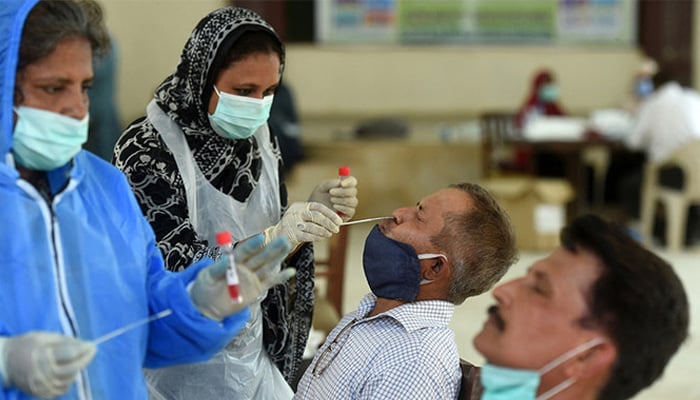Punjab hospitals ordered to ensure testing as COVID-19 rears head globally
"Testing only tool to assess magnitude of disease," Punjab health department statement reads
LAHORE: The hospitals and medical facilities in Punjab have been directed to enhance testing for COVID-19 amid the reports of a surge in cases across the globe.
A significant rise in cases of a variant of the pandemic disease has recently been reported, giving rise to the risk of spread.
"I am directed to refer to the subject cited above and to state that according of media reports, a surge in COVID-19 cases is once again being reported in various parts of the world," an official of the Punjab health department said in a statement.
It stated that COVID-19 testing is the only tool to assess the magnitude of the disease and to curtail the transmission of this deadly disease.
The statement directed all the authorities concerned to comply with the orders in true letter and spirit.
The directives come days after the reports of a 52% rise in COVID-19 cases globally during a 28-day period, starting from November 20 to December 17, 2023, as compared to the previous 28-day period, with over 850,000 new cases reported.
The World Health Organisation (WHO) on December 24 issued a new COVID-19 epidemiological update on the global and regional situation, with information on hospitalisations and ICU admissions, and updates on the variants of Interest and variants under monitoring.
Later, the Centers for Disease Control and Prevention (CDC) recently reported that the new COVID-19 variant, JN.1, now accounts for 44.1% of cases in the United States, indicating a significant increase in the fast-spreading variant's prevalence.
The increase in JN.1 infections is more than two times larger than the 21.3% estimate for the week ending December 9, after Thanksgiving, CBS News reported, citing CDC’s findings.
-
Security forces gun down 30 terrorists in multiple IBOs in KP: ISPR
-
MQM-P calls for new province in Sindh
-
US report validates Pakistan military edge over India: PM
-
Banned TTP poses serious threat to Pakistan security: UNSC panel
-
CM Afridi clarifies remarks on by-poll after ECP requests army deployment
-
Dubai sees 3.2m Pakistani passengers in 2025 as airport sets new milestone
-
Security forces kill 23 Indian proxy terrorists in KP's Kurram
-
Pakistan to construct island to boost oil exploration: report












